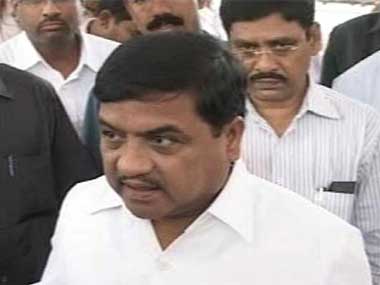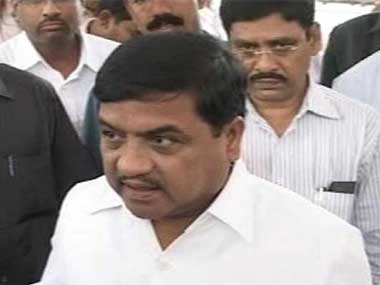When he travelled to Europe on a break with some party colleagues, Raosaheb Ramrao Patil suddenly found it inconvenient to chew tobacco. His co-vacationers, Ajit Pawar and Dilip Walse Patil recalled how the man was hard put to spit on the snow or in any public spaces - it would have been so visible to the Swiss and brought him at odds with the law - that the man who later became a deputy chief minister was beside himself. Had he only made a virtue of the necessity not to spit and given up on his chewing, the oral cancer may not have felled him yesterday. It is not known that RR Patil aka Aaba ever made a serious effort to abandon the risky habit. However, he helped inject a sense of cleanliness in rural areas with a programme which awarded the best village, best taluk, and district for ensuring hygiene. [caption id=“attachment_2103363” align=“alignleft” width=“380”]
 Ibnlive image[/caption] Of the several criteria on which a village was judged for an award under the Gadge Maharaj Swachhata Abhiyan, one was whether people spat indiscriminately. It is likely that if Aaba was a resident of a village, it may have missed the award for that one simple reason. It is time his death by cancer becomes the centrepiece of an anti-tobacco campaign. One of his tasks was to keep the banned gutka out of Maharashtra. There is another irony to his life. In a party now seen as the most corrupt – the adjective is likely to apply to any political party as honesty norms go – he was seen as ‘Mr Clean’. That too when he held the Home portfolio for so long. As government departments go, and if number of cases against police is an index, that is a surprise. The man sorely needed money to fight his rivals in his home district – Jayant Patil of the NCP, Patangrao Kadam and the descendants of Vasantdada Patil. The cleanliness campaign which he launched was before the anti-defecation drive encouraged by the Centre and it saw half the awards that were given away at the Rashtrapati Bhawan coming Maharashtra’s way. His genius was in naming it after Gadge, a mendicant who entered a village with his broom to sweep it before accepting alms for building education assets – schools and hostels. Gadge, whose christened name was Debuji Zhingraji Janorkar passed away in 1956. This Gadgebaba scheme also led to Maharashtra being forced to accept the World Bank’s concept of financing rural drinking water projects only if they were demand driven. The Shiv Sena-BJP government (1995-99) had told the bank that the ten per cent contribution wouldn’t be easily forthcoming from the locals even if there was a sore need for water. When they came to study this cleanliness campaign’s benefits and saw how people contributed with both labour and money to compete for awards, they told the government that demand driven schemes will be successful. The paradigm was changed. In that sense, RR Patil’s contribution to Maharashtra was greater as a Rural Development Minister than as the one who held the powerful, but disreputable Home Portfolio. His other significant contribution unfortunately less often referred to is the Tantamukta Gram – dispute free villages – which made life a tad more comfortable since in small spaces even a few disputes can, and do, upend the peace of a population. These two are his lasting contribution to Maharashtra. As a Home Minister, he brought a moral dimension to policing – closing down bars at 11 pm, banning ‘ladies dance bars’ – which was not much appreciated in a city known for its love of nightlife. That he died the same day newspapers reported Mumbai police commissioner Rakesh Maria’s cleared bars in non-residential areas to remain open all night was a cruel coincidence. Patil may not have approved of it at all, especially because the demand had come from the Shiv Sena scion, Aditya Thackeray. Apparently his understanding of the rural milieu was better than of the urban ways though he could have done better in curbing police corruption and brutality. He may not have been corrupt, a la Manmohan Singh, but winked at the widespread and deeply entrenched culture of venality. That explains why he said in cities such “small incidents happen”, referring to the terror attacks on CST, the Taj, and the Oberoi in Mumbai in 2008. The recent gaffe that would have troubled Aaba all his life was an election campaign speech in which while referring to a rival, he said the man may have desisted from an alleged rape at least till the elections were over. This did not, however, gain the currency and life of another NCP leader, Ajit Pawar’s angry outburst during a drought: “What do I do to keep the dams filled? Pee in them?” or words to that effect. That is because, despite his image, he was lower in rank in the NCP which has the dynastic principle in full play. Patil was a good man, soft spoken but not easily accessible on the cell phone which almost always remained switched off. However, when I called him from Bangalore when he got to be the deputy chief minister after Chagan Bhujbal, he exulted not about the fact that he got the post but about being elected in a ballot in the legislature party. He got it by his right, not as something given by the strongman Sharad Pawar. Such ballots were never held before or after that in the party.
Ibnlive image[/caption] Of the several criteria on which a village was judged for an award under the Gadge Maharaj Swachhata Abhiyan, one was whether people spat indiscriminately. It is likely that if Aaba was a resident of a village, it may have missed the award for that one simple reason. It is time his death by cancer becomes the centrepiece of an anti-tobacco campaign. One of his tasks was to keep the banned gutka out of Maharashtra. There is another irony to his life. In a party now seen as the most corrupt – the adjective is likely to apply to any political party as honesty norms go – he was seen as ‘Mr Clean’. That too when he held the Home portfolio for so long. As government departments go, and if number of cases against police is an index, that is a surprise. The man sorely needed money to fight his rivals in his home district – Jayant Patil of the NCP, Patangrao Kadam and the descendants of Vasantdada Patil. The cleanliness campaign which he launched was before the anti-defecation drive encouraged by the Centre and it saw half the awards that were given away at the Rashtrapati Bhawan coming Maharashtra’s way. His genius was in naming it after Gadge, a mendicant who entered a village with his broom to sweep it before accepting alms for building education assets – schools and hostels. Gadge, whose christened name was Debuji Zhingraji Janorkar passed away in 1956. This Gadgebaba scheme also led to Maharashtra being forced to accept the World Bank’s concept of financing rural drinking water projects only if they were demand driven. The Shiv Sena-BJP government (1995-99) had told the bank that the ten per cent contribution wouldn’t be easily forthcoming from the locals even if there was a sore need for water. When they came to study this cleanliness campaign’s benefits and saw how people contributed with both labour and money to compete for awards, they told the government that demand driven schemes will be successful. The paradigm was changed. In that sense, RR Patil’s contribution to Maharashtra was greater as a Rural Development Minister than as the one who held the powerful, but disreputable Home Portfolio. His other significant contribution unfortunately less often referred to is the Tantamukta Gram – dispute free villages – which made life a tad more comfortable since in small spaces even a few disputes can, and do, upend the peace of a population. These two are his lasting contribution to Maharashtra. As a Home Minister, he brought a moral dimension to policing – closing down bars at 11 pm, banning ‘ladies dance bars’ – which was not much appreciated in a city known for its love of nightlife. That he died the same day newspapers reported Mumbai police commissioner Rakesh Maria’s cleared bars in non-residential areas to remain open all night was a cruel coincidence. Patil may not have approved of it at all, especially because the demand had come from the Shiv Sena scion, Aditya Thackeray. Apparently his understanding of the rural milieu was better than of the urban ways though he could have done better in curbing police corruption and brutality. He may not have been corrupt, a la Manmohan Singh, but winked at the widespread and deeply entrenched culture of venality. That explains why he said in cities such “small incidents happen”, referring to the terror attacks on CST, the Taj, and the Oberoi in Mumbai in 2008. The recent gaffe that would have troubled Aaba all his life was an election campaign speech in which while referring to a rival, he said the man may have desisted from an alleged rape at least till the elections were over. This did not, however, gain the currency and life of another NCP leader, Ajit Pawar’s angry outburst during a drought: “What do I do to keep the dams filled? Pee in them?” or words to that effect. That is because, despite his image, he was lower in rank in the NCP which has the dynastic principle in full play. Patil was a good man, soft spoken but not easily accessible on the cell phone which almost always remained switched off. However, when I called him from Bangalore when he got to be the deputy chief minister after Chagan Bhujbal, he exulted not about the fact that he got the post but about being elected in a ballot in the legislature party. He got it by his right, not as something given by the strongman Sharad Pawar. Such ballots were never held before or after that in the party.
Mahesh Vijapurkar likes to take a worm’s eye-view of issues – that is, from the common man’s perspective. He was a journalist with The Indian Express and then The Hindu and now potters around with human development and urban issues.
)